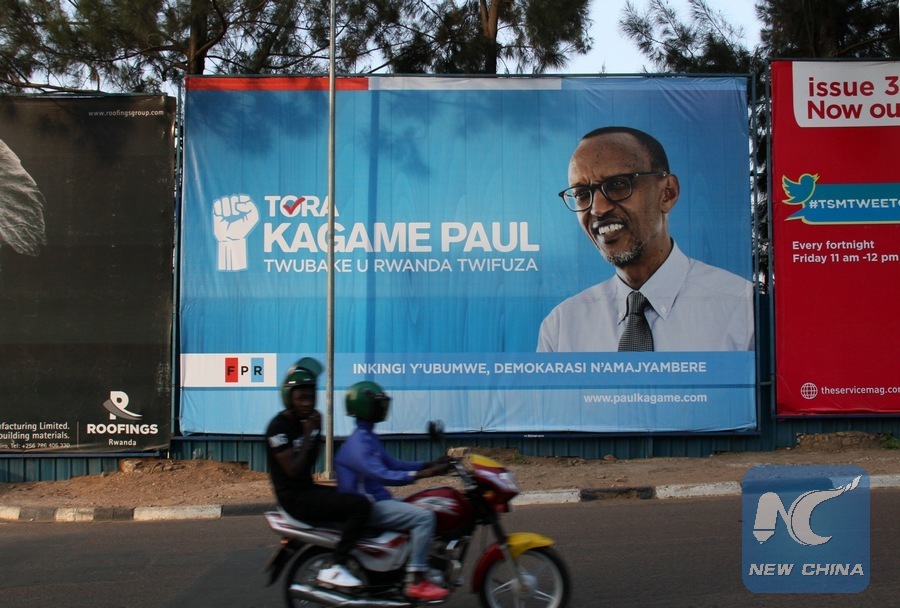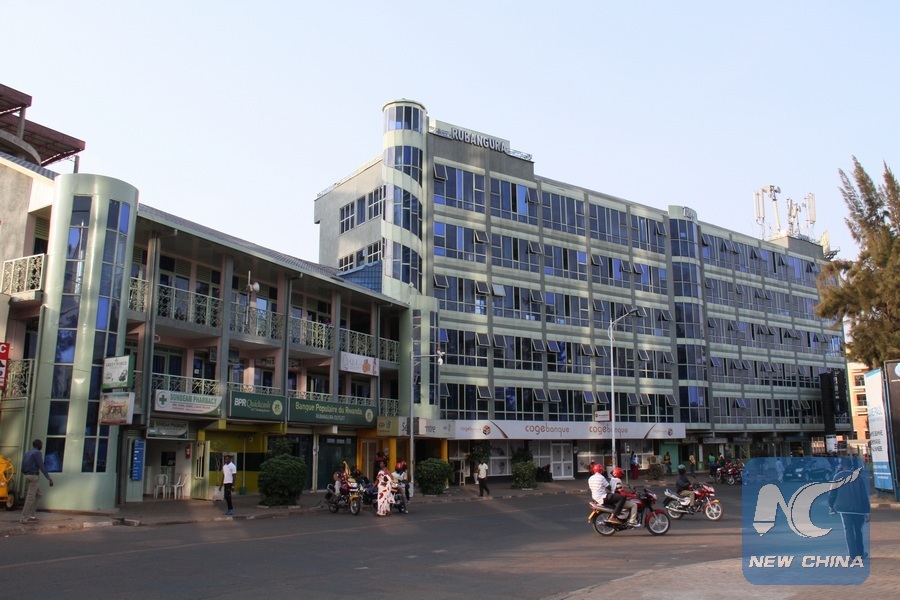
A billboard of Rwandan presidential candidate and the incumbent President of Rwanda Paul Kagame is seen along a street in Kigali, capital of Rwanda, July 30, 2017. Rwandans will go to polls on August 4 to decide the presidency for the next seven years. (Xinhua/Lyu Tianran)
by Frank Kanyesigye, Lyu Tianran
KIGALI, July 31 (Xinhua) -- The Rwandan government has overseen the tremendous growth of the country's social and economic sectors in the past seven years, a senior Rwandan official told Xinhua.
Chief Executive Officer (CEO) of Rwanda Governance Board (RGB) Anastase Shyaka spoke to Xinhua in an exclusive interview on Friday, a week before presidential elections scheduled on August 4.
RGB has been able to measure the country's growth using the RGB score card indicators, and all indicators of the country's economy show tremendous improvements across all sectors, said the head of RGB, whose mission is centered on promoting the principles of good governance.
The sectors are safety and security, infrastructure, governance and accountability, institutional development, agriculture and health and so on, said Shyaka.
Rwandans will go to the polls to decide the presidency for the next seven years. The three candidates are incumbent President Paul Kagame of the ruling party Rwanda Patriotic Front (RPF), Frank Habineza of the Democratic Green Party of Rwanda and Philippe Mpayimana, an independent candidate.
Rwanda performed "exceptionally well" across all sectors of the country's economy, said Shyaka, adding that the country has been ranked for several occasions among top five countries in Africa that have sustained rapid economic growth.
He said the government has performed well in home grown solutions like One Cow per Poor family commonly known as "Girinka", poverty eradication program Vision Umurenge Program (VUP) and health insurance scheme Mutuelle de sante.
In the last seven years, Rwanda has managed to build and strengthen democratic governance institutions resulting in an effective, accountable and transparent government that promotes a peaceful, just and equitable society, he said.
According to CEO, some development targets were set high that the country failed to reach in the last seven years, but the improvement is still outstanding.
About 6.8 million people will participate in this year's presidential elections, according to the National Electoral Commission of Rwanda. The voting date is scheduled on August 4, while the diaspora will vote on August 3.
Announcement of provisional presidential elections results will be no later than August 9, and the final results will be announced no later than August 16, read the presidential elections calendar released by NEC.
The main goals for the next elected government should be working on consolidating on what has not been achieved for the past seven years, he said.

Photo taken on July 30 shows a view of Kigali, the capital city of Rwanda. The Rwandan government has overseen the tremendous growth of the country's social and economic sectors in the past seven years, Chief Executive Officer (CEO) of Rwanda Governance Board (RGB) Anastase Shyaka spoke to Xinhua in an exclusive interview on Friday. (Xinhua/Lyu Tianran)
"There are areas where we know our performance is low and the needs are high, for instance infrastructure developments like access to electricity, road construction, promotion of made in Rwanda products among others."
Rwanda is aspiring to become a middle income by 2020 and this will be achieved if the upcoming elected government focuses on key drivers of the economy that will drive our country to middle income status in the next two years, he said, adding that the country also need to focus on higher levels of accountability and institutional development in the next seven years.
This year's presidential elections will be the third since the end of the ex-genocidal regime in 1994. Kagame gained landslide victories in the last two presidential elections held in 2003 and 2010 by winning 95 percent and 93 percent of the total votes, respectively.
According to him, Rwanda elections are among the safest and most secure elections in Africa. "We have not seen any violence in elections and the media is giving equal attention to all candidates," he said.

